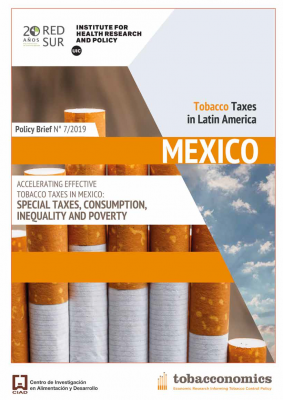
Acelerando la fiscalidad efectiva al tabaco en México: Impuestos especiales, consumo, desigualdad y pobreza
Este Policy Brief fue elaborado por Red Sur y presenta las principales recomendaciones de políticas que surgen de uno de los estudios de base para México, a cargo del Centro de Investigación en Alimentación y Desarrollo (CIAD) en el marco del proyecto UIC-Red Sur “Impuestos al tabaco en América Latina”, como parte del proyecto global coordinado por The University of Illinois at Chicago’s (UIC), Institute for Health Research and Policy y apoyado por Bloomberg Initiative to Reduce Tobacco Use.
Accelerating effective tobacco taxes in Mexico: Special taxes, consumption, inequality and poverty
This Policy Brief was prepared by Red Sur and presents the main findings and policy recommendations resulting from the background study for Mexico, by the Food and Development Research Center (CIAD, Centro de Investigación en Alimentación y Desarrollo), within the framework of the UIC-Red Sur project “Tobacco taxes in Latin America¨, as part of a global project coordinated by The University of Illinois at Chicago’s (UIC), Institute for Health Research and Policy and supported by the Bloomberg Initiative to Reduce Tobacco Use.
**Related publication:
Published: 22 September 2021
The impact of tobacco tax reforms on poverty in Mexico
Luis Huesca, Abdelkrim Araar, Linda Llamas & Guy Lacroix
SN Business & Economics
Abstract
is higher among the well-off than among the poor. Yet, tobacco tax rates in Mexico are lower than those in most LMIC countries. There is room, thus, to implement tax reforms and compensating policies to mitigate their impact on the poor. Our analysis is based on the stochastic dominance approach. More precisely, several tax reforms are analyzed through the so-called Consumption Dominance curves. In addition, the reforms are assumed to be revenue neutral and to give rise to compensating subsidies on specific goods. Our results show that if the Mexican government were to implement a WHO-type reform, poverty among households with at least one smoking member would increase by 2.6 % points. Yet, the deleterious effects are entirely mitigated by price subsidies on staple foods.
Keywords Tobacco taxation · Impact analysis · Excise taxes · Poverty · Stochastic dominance
